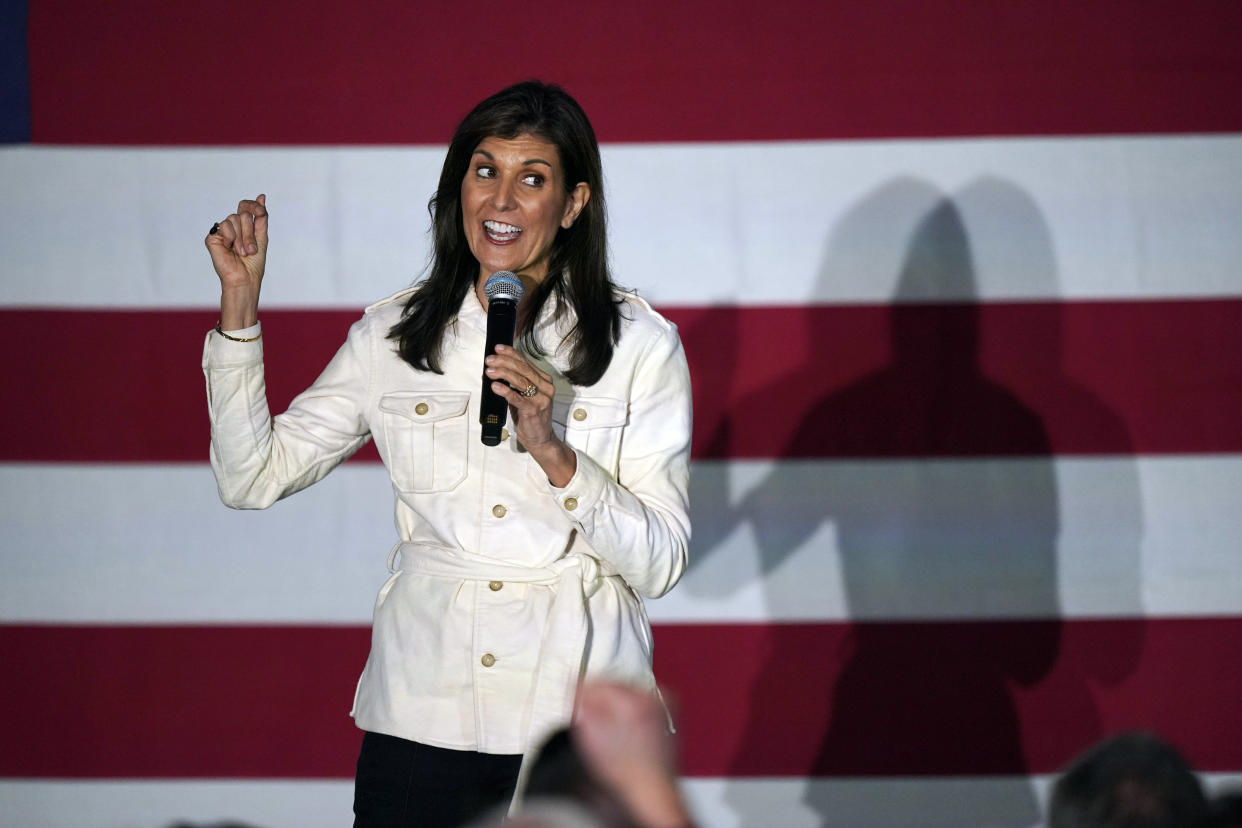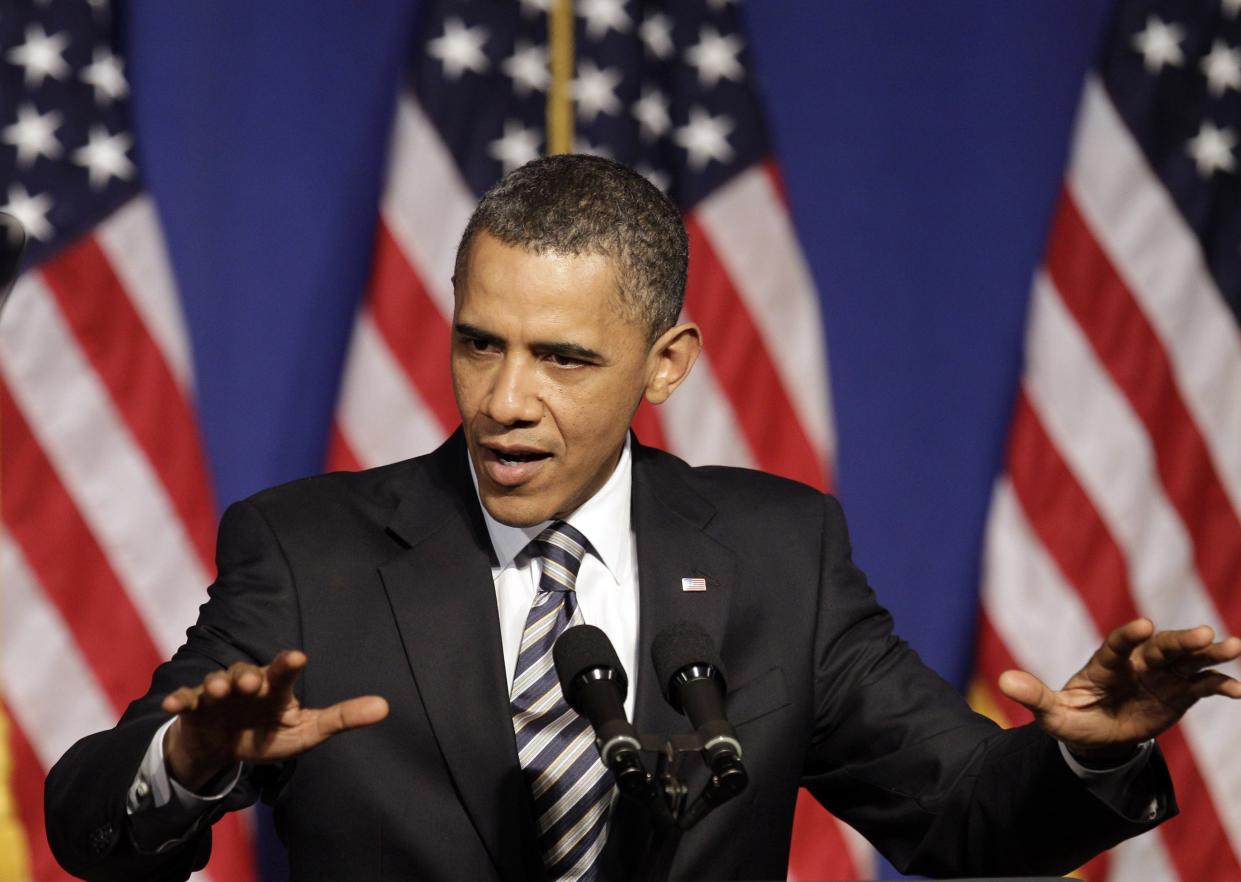Trump hints Nikki Haley is ineligible to be president. Here's why he's wrong.

Former United Nations Ambassador Nikki Haley is an American citizen born in the United States who is perfectly eligible under the Constitution to serve as president — despite former President Donald Trump’s recent insinuations that she is not.
And the same goes for every other rival candidate with immigrant heritage who has been targeted by Trump in the past.
Haley — Trump’s leading challenger for the 2024 GOP presidential nomination — was born in 1972 in Bamberg, S.C. That makes her “a natural born citizen” of the United States — one of three minimum qualifications for the presidency listed in Article II, Section 1, Clause 5 of the Constitution, along with being at least 35 years old and residing in the U.S. for at least 14 years.
“All the sources routinely used to interpret the Constitution confirm that the phrase ‘natural born Citizen’ has a specific meaning: namely, someone who was a U.S. citizen at birth with no need to go through a naturalization proceeding at some later time,” former Solicitors General Paul Clement (a Republican) and Neal Katyal (a Democrat) explained in a 2015 Harvard Law Review article.
So why is Trump suggesting otherwise?
Because Haley’s parents were born elsewhere — “in the Punjab region of India,” as the former South Carolina governor recounted in her 2012 autobiography. Haley’s father, Ajit Randhawa, and her mother, Raj Randhawa, legally immigrated to the U.S. in 1969. Haley was born three years later — and the 14th Amendment says that anyone born on American soil automatically becomes a citizen.
Regardless, Trump last week used his Truth Social account to spread a recent Substack post by a pro-Trump 2022 law school graduate arguing that Haley can’t be president because her parents weren’t yet U.S. citizens at the time of her birth — an argument that Geoffrey Stone, a constitutional law professor at the University of Chicago, described as “bonkers” in an interview with the Associated Press.
A few days later, Trump returned to Truth Social and referred to Haley as “Nimrada” — a misspelling of her first name, Nimarata. Haley has been known by her middle name Nikki, a Punjabi word meaning "little one,” since she was born. She took her husband’s last name when they married in 1996.
Trump’s own mother, Mary, meanwhile, was born in the Outer Hebrides of Scotland and immigrated to the U.S. in 1930. Yet casting doubt on the qualifications of people with immigrant heritage is a familiar tactic for Trump, who has repeatedly said that certain individuals have “good genes” and that undocumented immigrants are “poisoning the blood of our country.”
Trump has done this many times before
Starting in 2011, Trump spent five years boosting his political profile on the right by positioning himself as the leading proponent of the false conspiracy theory that Barack Obama — whose father was from Kenya — wasn’t born in Hawaii as specified on his birth certificate. In 2016, Trump finally admitted that so-called birthers were wrong and that “President Barack Obama was born in the United States.”

In early 2016, Trump questioned whether two of his Latino American opponents for the GOP presidential nomination — Florida Sen. Marco Rubio and Texas Sen. Ted Cruz — were eligible for the presidency under the natural born citizenship clause. The courts found that both Rubio (who was born in Florida to Cuban immigrants) and Cruz (who was born in Canada to a Cuban father and U.S. citizen mother) were qualified.
Later that same year, Trump claimed that U.S. District Judge Gonzalo Curiel — who was born in Indiana to Mexican immigrants — shouldn’t preside over civil fraud proceedings against Trump University because he was “of Mexican heritage.” Curiel continued on the case and later ruled, in a separate decision, that Trump’s Department of Homeland Security could waive environmental protection rules while building a wall along the southern border.
And finally, in 2020 Trump falsely said of Democratic vice presidential nominee Kamala Harris — who was born in Oakland, Calif., to a Jamaican father and Indian mother — that “she doesn’t meet the requirements” to serve. Incidentally, Trump was citing a discredited Newsweek article by the same lawyer, John Eastman, who was indicted this summer in Georgia for designing a scheme to help Trump overturn his 2020 election loss to Joe Biden.
Trump now faces legal challenges to his own eligibility for the presidency under the 14th Amendment’s insurrection clause.
